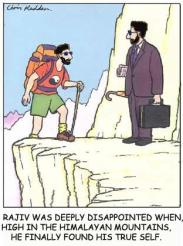The Parable of The Sadhu
When Bowen ‘Buzz” McCoy, then an Investment Banker at Morgan Stanley, recounts his experience traversing an 18,000 foot Himalayan peak, he reiterates the question that must plague every businessmen in the course of his career – the choice between the agreed supreme objective and individual morals or values. It is interesting to note that Buzz, who attended Stanford and did his MBA from Harvard became a Partner and Managing Director at Morgan Stanley. The amount that ones moral or ethical values govern ones decisions are a factor of the social and cultural context they are made in. The morals and values themselves are learnt from the same contexts and acquired by our interpretation of the world around u and of what is important. In this light, it is even more interesting to note that Buzz, who teaches courses on business ethics, as well as Christian theology and literature, at graduate business schools, churches, and seminaries served in Korea and received the U.S. Army Commendation Medal. A career in the army is prone to make one look at things in the perspective of the goal or the objective, much like that of an investment banker or lawyer. In modern society and businesses, ethics have taken on a role that is more akin to a hygiene factor than one governing business decisions.
 Mc Coy’s climbing partner, who helped the Sadhu, Stephen, saw the situation on a different light. How much of it can be attributed to his religiousness or other beliefs (Mc Coy described him as ‘a committed Quaker with a deep moral vision’) is arguable but one must agree that it is likely to have been a distinguishing factor in the way they both looked at the situation. The reactions of the others in the discussion initiated by Mc Coy’s narration of the incident, is similarly influenced by their own cultural influences. At the least, one can see a striking parallel between their reactions to the situation and the careers or lives they have selected for themselves. The first to voice her dissent against the ‘corporate goal’ was MIT’s Dr. Mary Rowe, one of the founders of the Ombudsman Association. Her sense of justice for the helpless and fair play is natural to her profession. In addition, she has written a number of papers on the need for and role of ethics in an organisation’s development. Similar is the immediate reaction of Ed Locke, ethical humanist who vociferously put forth that “there are values greater than the organisational objective, like life”.
Mc Coy’s climbing partner, who helped the Sadhu, Stephen, saw the situation on a different light. How much of it can be attributed to his religiousness or other beliefs (Mc Coy described him as ‘a committed Quaker with a deep moral vision’) is arguable but one must agree that it is likely to have been a distinguishing factor in the way they both looked at the situation. The reactions of the others in the discussion initiated by Mc Coy’s narration of the incident, is similarly influenced by their own cultural influences. At the least, one can see a striking parallel between their reactions to the situation and the careers or lives they have selected for themselves. The first to voice her dissent against the ‘corporate goal’ was MIT’s Dr. Mary Rowe, one of the founders of the Ombudsman Association. Her sense of justice for the helpless and fair play is natural to her profession. In addition, she has written a number of papers on the need for and role of ethics in an organisation’s development. Similar is the immediate reaction of Ed Locke, ethical humanist who vociferously put forth that “there are values greater than the organisational objective, like life”.
Our take-out then is that given that ethical behaviour is desirable, how does one ensure that it comes naturally to us. The B-school student who is entering the corporate world tomorrow is bred on his competitive streak and encouraged to look at none but the ultimate goal. Having established that ethics and morals are a function of the importance we attribute to these values, and are shaped by the culture and society we dwell in, how can we constructively improve this environment to ensure the desirable behaviour. The debate between intrinsic and extrinsic motivation is one that has been raised in this regard by Aristotelian ethics as well in his citing of the distinction between praiseworthiness and prize worthiness. Praise is given for the virtuousness of good actions. Having a model character is something we ought to prize. It is good for its own sake. This degree of selflessness and nurturing the need to do good for one’s own satisfaction cannot be taught in the classroom, but can definitely be encouraged in the teaching or institutional environment.
The reason J&J’s James Burke saw the decision to pull Extra-Strength Tylenol as a no-choice decision was because he was supported by a corporate culture that prided itself in its first priority being to the doctors, nurses and patients, and the mothers and all other who use their products. The difference between Mc Coy and J&J, as has been pointed out, is that the organisation had the time to develop an ethos and corporate value that not only made easier but necessitated the taking of such a decision. We, at our institute, or in the organisations we join tomorrow, are fortunate enough to have the luxury of forming such a culture. As with the institute, it is not enough to put our values in a pink booklet or espouse them from behind a wooden podium, but to bring them into practice. The point was raised in a second-year class last week when the erstwhile Joint Academic Secretary expressed his concern about the blatant use we make of material clearly marked ‘Do not Copy’ and whose intellectual ownership we borrow without permission. The recent official reports sent to the media regarding the food poisoning incident which cited the cause as a few students who had gone out of the institute without permission and eaten contaminated food is a typical example. More than anything else, the lack of an environment in which the various members have any platform to interact other than the designated official channels is a serious cause for concern. It is one of the primary reasons why members of the community see themselves as distinct groups rather than belonging to the same larger community. As Mc Coy said, “An open communication system negates the need for whistle blowing”.
| Top 5 Instrumental Values | |
| Alok | Ambitious, Courageous, Intellectual, Cheerful, Loving |
| Animesh | Intellectual, Honest, Logical, Polite, Responsible |
| Anshul | Clean, Polite, Self-controlled, Independent, Obedient |
| Gurpreet | Obedient, Cheerful, Helpful, Broad-minded, Self controlled, Independent |
| Siddhartha | Intellectual, Broad-minded, Imaginative, Forgiving, Independent |
 www.foolonahill.com
www.foolonahill.com